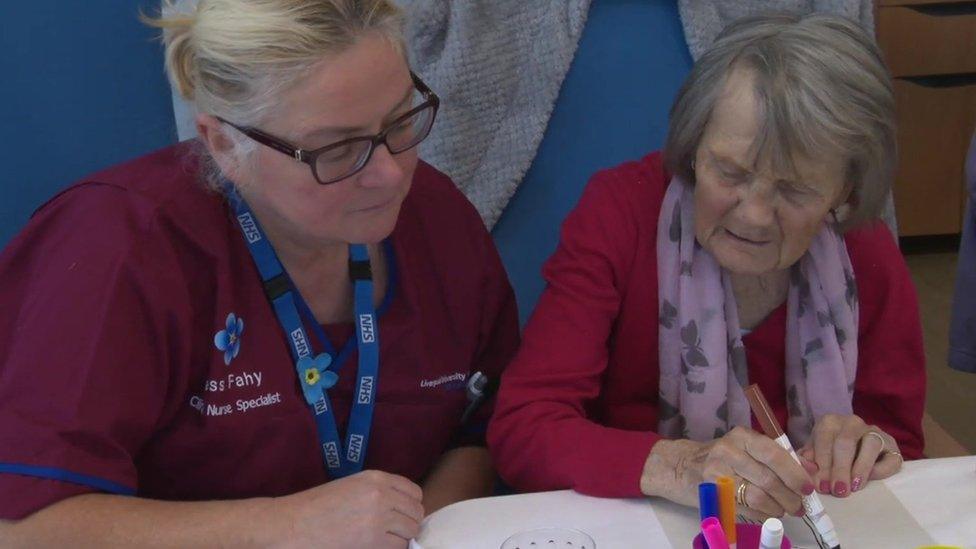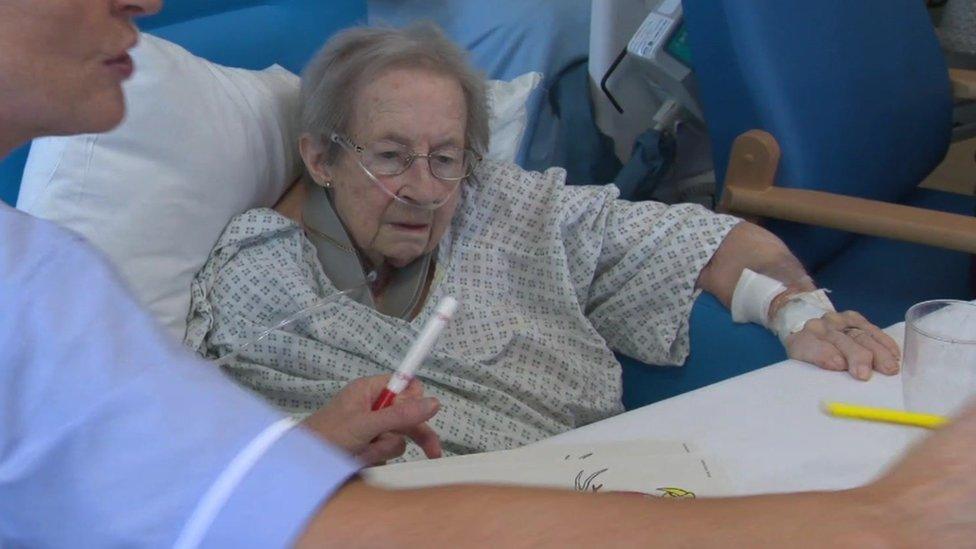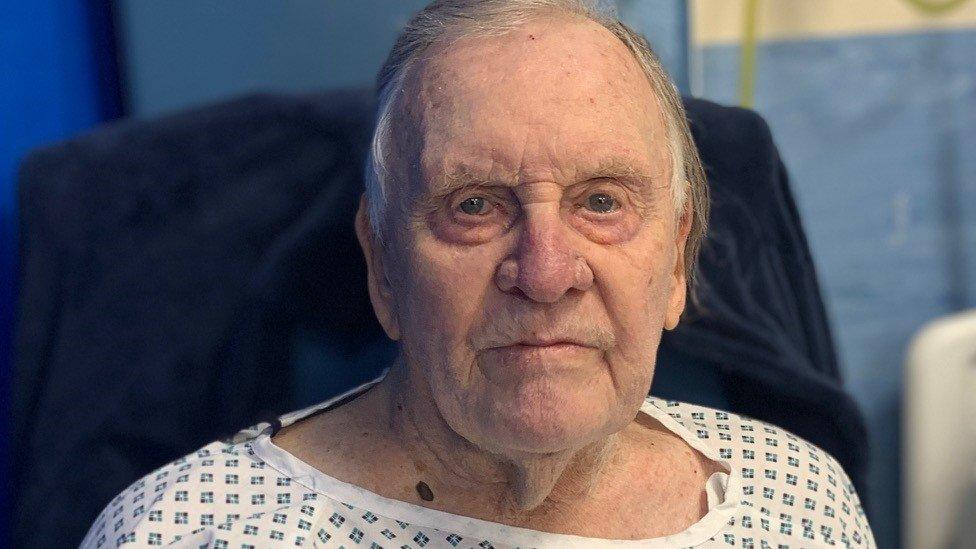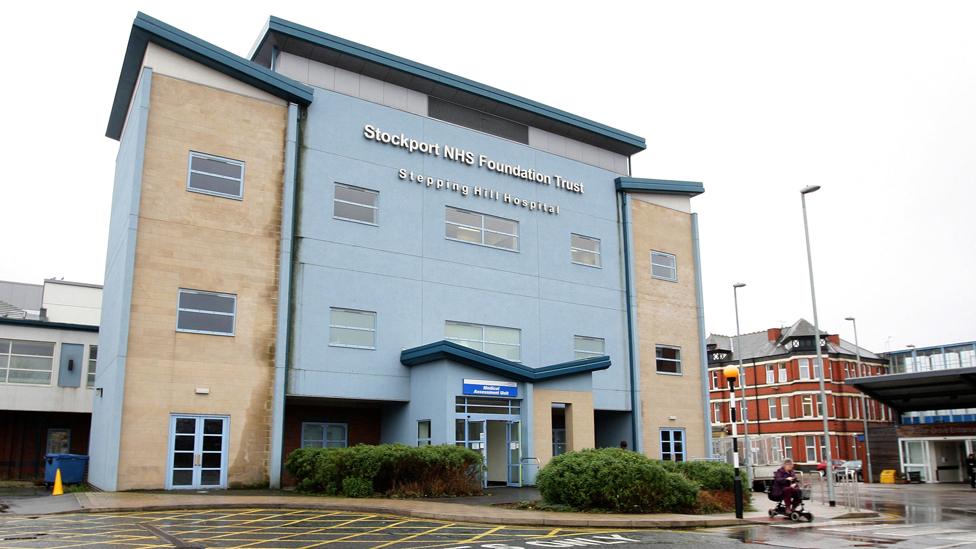Hospital discharges: Getting patients home has become a 'real challenge'
- Published

Staff at Broadgreen Hospital in Liverpool work with patients to try and prepare them for discharge
BBC research has revealed that in some hospitals in the North West, fewer than one in 10 patients who could go home are able to leave.
It is mainly because of a lack of social and community care provision and it is leaving thousands of patients stuck in hospital when they should be somewhere else.
That is a big problem for both them and the hospitals.
At Broadgreen Hospital in Liverpool, there are efforts being made to get some patients fitter for life away from the site.
At an art class, six patients, who are all older women, sit round a large table in the middle of a ward, colouring in nature scenes and playing board games.
Each one has a dedicated health care worker helping them. It is a busy, happy scene.
"I love this… I'm very much a game player," says Lola Davies, who has been in several hospitals over the past few months.
Fellow patient Anne Doyle, who has her arm and shoulder in a sling after a fall, agrees it is "a great place to be".
"The staff are excellent and the company; the things they organise are so inspiring," she says.

The ward, which mainly targets older, frailer patients, offers games to promote mental and physical agility
The reablement ward helping them has been open just over a year.
Ward manager Sophie Edwards says the aim is "to promote independence for our patients".
"Get them up, get them out of bed every morning, get them dressed… they all communicate better together and it just keeps them really positive while they're in hospital," she says.
The ward, which mainly targets older, frailer patients, offers daily physiotherapy and games to promote mental and physical agility.
Many of the activities are unusual for a hospital, but many of the patients should not still be in one.
They are stuck because they have nowhere else safe and available to go to.
'We're stuck'
Teresa Richardson is in charge of keeping the patients moving smoothly through the hospital from arrival to discharge.
She says of the 23 patients on the ward, 18 could probably leave if community care packages were in place.
She also says the trust's two other, bigger hospitals are "bursting at the seams".
"We've got patients in A&E [in those hospitals] who need to be admitted... but we can't do that because there are no patients being discharged," she says.

Les Smith is one of those benefiting from the reablement ward
BBC research has found that between June 2022 and June 2023, fewer than one in 10 patients in this trust were able to leave hospital when ready.
As a whole, the North-West was the worst region in England for discharges, lying 11% below the national average.
The main reason is something the hospitals have virtually no control over - social and community care.
"Some patients do need intensive rehab in the community," Ms Richardson says.
"If those beds [and] care packages aren't available, we're stuck, we can't move a patient.
"So the biggest problem we've got is community services."
NHS Cheshire and Merseyside, the organisation tasked with getting community and hospital care to work together, says one major issue is a shortage of staff in the home care sector.
"Often I've got beds in care homes, but you want to get someone back into their [own] home," medical director Professor Rowan Pritchard Jones says.
"Putting together those packages of care... for our patients remains a real challenge."
As a hospital consultant, Prof Pritchard Jones is acutely aware of the difficulties the current situation is causing, but says high deprivation levels often mean many people's homes are too unhealthy to be lived in, not least because they cannot afford to heat them.
"We get them into hospital and quite rapidly get them sorted from a medical point of view, but their home is utterly unsuitable," he says.
"It is not a safe place to get them back to [and] we will not send patients home to something which is unsafe."
The organisation is piloting a scheme to fit new boilers and insulation in vulnerable people's homes to speed the process.
'Intensive work'
The Liverpool trust is one of the worst affected in the country, but two others in Greater Manchester are in an even worse position.
At Stockport's Stepping Hill, 93% of the patients who could go home were not able to, and it was a similar picture for the Northern Care Alliance, which runs sites in Salford, Oldham, Bury and Rochdale.
Those two trusts have the highest figures in England, with hospitals serving Wigan and Warrington also in the national top 10.
Greater Manchester's predicament is particularly alarming, given that the devolved body which runs it was handed a special £450m transition fund in 2016, which was partly aimed at getting NHS and social care to run together more smoothly.
Two of the first grants, worth £37m, were handed to Stockport and Salford, largely to complete that aim, so them topping the table raises questions.

At Stockport's Stepping Hill, 93% of the patients who could go home were not able to
The Stockport and Northern Care Alliance Trusts and Greater Manchester Integrated Care Partnership all declined interviews.
In a statement, Stockport NHS Foundation Trust said its older population was significantly higher than other areas of Greater Manchester and it also admitted a high number of patients from neighbouring areas.
It also said it had taken measures to significantly reduce delayed discharges and long stays.
The Northern Care Alliance said there were increasing pressures across the health and social care system and it had several programmes aimed at improving patient flow, including Hospital at Home initiatives.
Greater Manchester Integrated Care Partnership said their figures had been showing improvements since June, and "intensive work" was taking place ahead of the winter, including same day urgent care and virtual wards.
Back in Broadgreen Hospital, 85-year-old Les Smith is tucking into a sandwich.
He was flown home from a hospital in Benidorm after having severe chest pains while on holiday.
After a couple of weeks at the Royal Liverpool, he is now getting prepared for discharge.
He says he has been getting daily physiotherapy to help him regain his strength and is "looking forward to getting back to where I used to be".
"Maybe I might not reach that point, but that's what I'm hoping to get to," he says.
His progress and that of others has seen the reablement ward become such a success, the hospital has opened another.
Yet whatever they do in here, it is the lack of resources outside which risks keeping hospital beds full this winter.

Why not follow BBC North West on Facebook, external, X, external and Instagram, external? You can also send story ideas to northwest.newsonline@bbc.co.uk, external